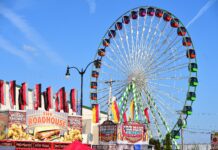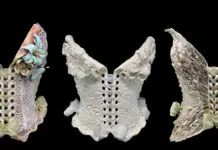Two of our state’s most significant contributions to the pop music scene, blues-rocker Elvin Bishop and world-renowned drummer Jim Keltner, share some interesting parallels. Both were born in 1942: Keltner in Tulsa, Bishop in southern California. When Bishop was 10, his family moved to Tulsa. When Keltner was 13, his family moved to southern California.
They are alike in at least one other way: Neither man began his music career in Oklahoma. After graduating from Tulsa’s Will Rogers High School, Bishop went off to the University of Chicago on a full scholarship, ultimately finding the city’s blues scene more compelling than studying physics. Keltner, on the other hand, set his sights early on baseball instead of music, pitching a no-hitter while still in little league. And when he did start drumming seriously, he far preferred jazz to rock ‘n’ roll.
And although nothing he did in Tulsa indicated that he would grow up to become one of the leading drummers in all of rock, there was perhaps a portent or two.
“My dad was in the Akdar Shrine Drum Corps,” Keltner recalls. “The first time I ever saw him play was when my mom took us to a parade. I was sitting on the curb, and I could hear the sound of the drums coming down the street. I remember I started getting chills as it got closer. And as they walked past us, I saw my dad playing his snare drum, and then this enormous, big, funky sound was marching down the street right past me.
“That was probably the game-changer right there,” he adds. “I fell in love with the whole thing. It floored me. I think it was for that reason that my dad took me to one of their rehearsals later.”
Held in the basement of Tulsa’s Akdar Shrine Temple, the rehearsal, remembers Keltner, was full of men puffing on cigars, drinking Scotch and regaling one another with off-color jokes. “To this day,” he says, “when I smell cigar smoke and booze in a club or something, it takes me right back there.” The 12-year-old sat and listened to them practice, and when they were done, he picked up his dad’s sticks and recreated the exact cadence they’d been working on.
“I don’t remember being surprised,” Keltner says. “But it surprised them a lot.”
His father brought the snare home, setting it up in a closet. “It’s odd, but it was a real personal kind of sound for me in there, with all the clothes hanging and everything,” Keltner recalls. “I gave my little sister Judy a spoon and I told her, ‘Hit the edge of the head here like this – just go, one, two, three four, one, two, three four.’ She’d play that for me, and I’d play the cadence against it. It was the first little contrapuntal thing I remember doing, and it was totally fascinating to be able to hear that and feel that.”
His dad bought him a drum set soon after, and the family stayed in Tulsa long enough for Keltner, then a seventh grader, to play in the Roosevelt Junior High School orchestra and take a few lessons from noted local drummer Charles Westgate.
But if music was something that brought Keltner and his family closer together, it was also splitting his mom and dad apart. His mother’s brother, Willie “Smokey” Mendoza, was the bassist for Johnnie Lee Wills, who was then fronting the house band at Cain’s Ballroom. Keltner’s dad was working two jobs, keeping him busy day and night, and his young wife loved to go out and dance, especially to Wills’ western swing. It was not a recipe for marital harmony. It did, however, lead to their move west.
“They left Oklahoma because of so many crazy problems,” he explains, “like my mom having another life, and my dad working two jobs. They were going to divorce. I’d wake up in the morning, and I’d be hearing nothing but fights, because my dad worked the night shift and my mother had been out dancing.”
So, in August 1955, Keltner recalls, “We pulled out of our driveway on Woodrow Place in Tulsa with three things in a little trailer behind Dad’s new Chevy: our clothes in suitcases, my drum set and a TV set. You would think that music was my destination, but in reality it wasn’t. There was nothing to portend that. What I was, was a baseball player.”
That changed, however, when they reached southern California. Keltner’s father, a painter, landed a foreman’s job at the Santa Anita racetrack, and the family settled in Pasadena. But one day when Keltner was on the baseball field, he started breaking out in hives. Exertion and sweating, it turned out, was the cause.
“So what was I going to do?” he asks. “Sports was out of the question for me at that point, and I was already playing music. I was in a dance band called the Moonglows, a little combo with trombone, trumpet, alto sax, clarinet, piano, bass and drums. My first professional gig was at Pasadena’s Jefferson Recreation Center. My mom had a picture, which I have hanging in my house now, with a dollar bill at the bottom. It says, ‘Jim’s first dollar.’”
By the time his junior year came along, he’d discovered jazz. “That’s the way I was coming up,” he says. “I was a jazz player. I was a jazz lover. I couldn’t hear any kind of rock ‘n’ roll that excited me at all.”
He married right out of high school, kept playing jazz, and took a job at a local music store, where he also gave drum lessons. He was behind the counter one day when Gary Lewis walked in and asked if he could take a few lessons.
“He’d already had a big hit, ‘This Diamond Ring,’ and I gave him four or five lessons,” remembers Keltner. “Then one day, he said to me, ‘You know what? I’m going to play the guitar in front of the band. Why don’t you be my drummer?’”
At the time, Keltner was making $85 a week playing jazz, teaching and working at the store. Lewis offered him $250.
“So I flipped out and did it,” laughs Keltner. “Got my hair cut, shaved my moustache and became this cute little rock ‘n’ roll guy.”
Through Lewis, Keltner met fellow Tulsa native Leon Russell, who was producing the Gary Lewis and the Playboys sessions. Russell had stocked the Playboys with Tulsans, including guitarist Tommy Tripplehorn and bassist Carl Radle, and Keltner was soon palling around with them and other hometown boys who’d come to the West Coast in search of a music career,
Keltner certainly found his, as even a cursory glance at his biography will tell you. From John Lennon, George Harrison and Ringo Starr to the Stones and Pink Floyd, Keltner can put his roster of musical collaborators up against anyone’s.
And while that career may not have started in Tulsa, as was the case with so many of his contemporaries and friends, Oklahoma certainly influenced, and continues to influence, his position in rock music’s stratosphere.
“To me, Tulsa represents everything that I am in my flesh and bones,” Keltner says. “Being born in Tulsa in 1942 to a great Okie man and a little Mexican girl – that’s who I am. That’s what you hear when you hear me play. Oklahoma is more than just the place I lived. It’s my musical home. It’s my heart’s home.”

























